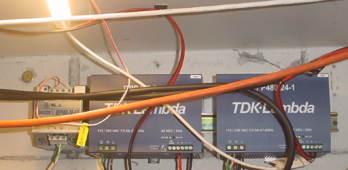tmbiv56
New Member
Hi all.
Here is what I'm thinking...
I am planning to build a 2000 sq ft. house with several aging in place concepts.
One of those, is lighting color that is similar to sunlight. To achieve this, I am looking for high cri (90+) lights, and that allow the ability to control brightness and color. Since I will be totally off grid, and my power source is battery based (48v), I am thinking I could wire for DC lighting.
I have read a lot about the higher gauge wires for DC wiring.
My thoughts are to run 48v from a distribution panel to different areas of the house where lighting is needed. Probably 70' would be my longest run.
What I don't know, are the available ceiling lights which are DC and what their amperage requirements are. It seems like most are either 12 or 24 volts, but I prefer 24vdc. This being the case, I was thinking that I can group the light units in based on area or amperage limitations. But, at the end of each run, I am thinking about using a buck converter or LED driver to reduce the voltage to 24vdc.
I have about 1000 feet of 2 conductor 16gauge cable I thought I could use for this purpose.
Most of the calculators that I have used say I can get 10 - 12 amps on 16 gauge at 70' with a 25% voltage drop to 36volts.
I guess, I need a sanity check on the idea, and if feasible, then what companies sell ceiling task lights which accept 24vdc? (and which allow color control and brightness control?)
I'm a DIY'er and have no experience at house wiring except through my own shocking results.
Tom
Here is what I'm thinking...
I am planning to build a 2000 sq ft. house with several aging in place concepts.
One of those, is lighting color that is similar to sunlight. To achieve this, I am looking for high cri (90+) lights, and that allow the ability to control brightness and color. Since I will be totally off grid, and my power source is battery based (48v), I am thinking I could wire for DC lighting.
I have read a lot about the higher gauge wires for DC wiring.
My thoughts are to run 48v from a distribution panel to different areas of the house where lighting is needed. Probably 70' would be my longest run.
What I don't know, are the available ceiling lights which are DC and what their amperage requirements are. It seems like most are either 12 or 24 volts, but I prefer 24vdc. This being the case, I was thinking that I can group the light units in based on area or amperage limitations. But, at the end of each run, I am thinking about using a buck converter or LED driver to reduce the voltage to 24vdc.
I have about 1000 feet of 2 conductor 16gauge cable I thought I could use for this purpose.
Most of the calculators that I have used say I can get 10 - 12 amps on 16 gauge at 70' with a 25% voltage drop to 36volts.
I guess, I need a sanity check on the idea, and if feasible, then what companies sell ceiling task lights which accept 24vdc? (and which allow color control and brightness control?)
I'm a DIY'er and have no experience at house wiring except through my own shocking results.
Tom



